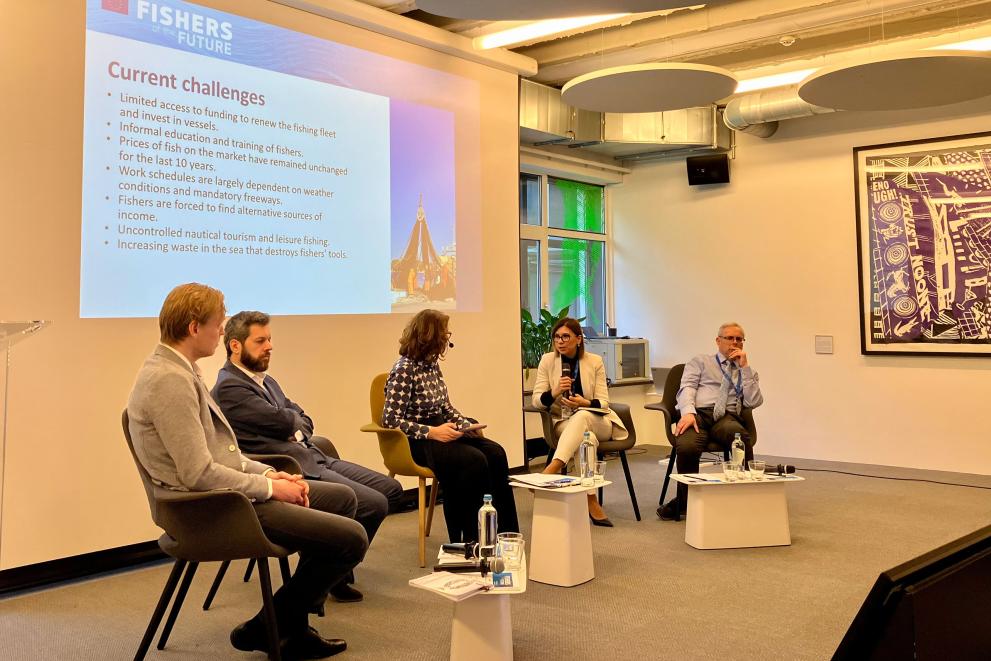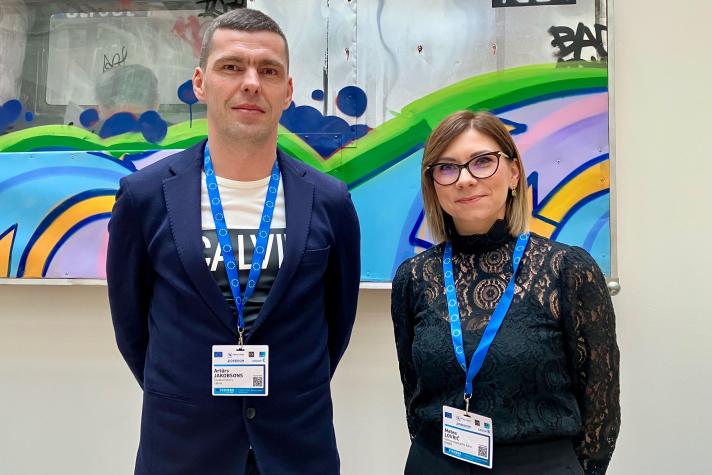
The European Commission’s Directorate-General for Maritime Affairs and Fisheries welcomed stakeholders from the public and private sectors at the Fishers of the Future event in Brussels on 19 March 2024.
In his opening remarks, Deputy Director-General Kęstutis Sadauskas highlighted the importance of the study, which will examine the role of fishers in society by 2050: “For fishers, and in fact for many primary food producers across Europe, times are changing, rapidly and relentlessly, which is why it is so important to gather so many of you working in the fishing sector to engage in our future thinking.”
The event aimed to introduce the Fishers of the Future study and its first-phase findings to all stakeholders while announcing the forthcoming steps. It provided a platform for stakeholders to offer feedback and actively contribute to the process.
To illustrate the challenges at stake, a panel discussion involved two representatives of fishers, large and small scale, from different sea basins, and two experts of the sector.
Matea Lovrić, Director of the Adria Fishing Cooperation in Croatia, highlighted the challenges linked to society's negative views of fishers and the need for better training.
Dominic Rihan, Head of the Killybegs Fishermen's Organisation (KFO) in Ireland, pointed to the challenges of Brexit and the need to build trust with the sector to face these challenges.
Francois Bastardie, senior researcher at the National Institute of Aquatic Resources, Technical University of Denmark, emphasised the need to adapt fishing techniques to limit fisheries’ bycatch and impact on the seabed, recognising the need to compensate for trade-offs and upfront costs made by fishers during the transition.
Tim Haasnoot, Director of ProSea Marine Education, stressed the need to upskill the sector to make it more attractive to future generations. Since 2001, he has trained thousands of fishers in sustainable fishing practices, economics, fisheries management, labelling, certification, and communication.
The event successfully brought together different viewpoints on the sector and its future. Participants had the opportunity to engage during breakout groups, where they were invited to discuss three profiles of today’s fishers each, and how the challenges – which the study team identified during the first phase – would affect them.
The discussions also reflected the need to embed gender dimensions and improve the representation of different groups of fishers, sea basins and vessel sizes in the profiles for 2050. The latter was of particular importance to participants online, as well as methodological aspects and sources of the study.
There is still time to give your feedback on the 12 profiles of today’s fishers
You can consult the 12 profiles on this website and provide feedback in any EU language until 30 April 2024. Your feedback will contribute to defining the fishers of the future as part of the study’s final phase.
About the methodology and sources of the current fishers’ profiles
To develop the profiles of today’s fishers, the study team used multiple sources of information in an iterative, consultative manner.
22 country reports (coastal Member States) were drawn by national experts based on
-
A review of national literature in each country
-
Group discussions and interviews on the ground, based on a determined set of questions, with
- Around 200 fishers from the 22 EU coastal Member States
- Other stakeholders such as fisheries local action groups (FLAGs), managing authorities, and fisheries research organisations, including the outermost regions
- Surveys in countries with lower in-person engagement of fishers
The study’s core team then complemented the primary data with a further review of relevant European and international literature, including from the Scientific Technical and Economic Committee for Fisheries (STECF).
The purpose of these profiles of today’s fishers is to capture a range of current characteristics of fishers across the EU, generate discussion and inform the content of the profiles for 2050. They thus contribute to the subsequent study phases, specifically, to consider how drivers and challenges might impact and shape them by 2050. Given that this is a foresight exercise, the profiles in 2050 are the key output of the study.
About the methodology and sources of the drivers, challenges and future scenarios
The study is now exploring future scenarios in which fishers might be living and working in 2050 through a collaborative process.
Based on input from the research conducted at national level, foresight evidence from the European Commission and expert knowledge, the study team first conducted an analysis of megatrends, relevant drivers of the transitions and concrete challenges.
To validate the drivers and challenges identified, the team conducted an open-link survey that was shared with fisheries stakeholders. The survey ran for 7 weeks and garnered 180 responses from fishers and fishers' representative bodies, civil society, academia, national/regional and EU institutions. The survey served to identify the drivers perceived as most important and uncertain for EU fishers and the most important challenges facing fishers.
Following the kick-off event on 19 March, selected stakeholders with a strategic perspective on the fishing sector overall will discuss the drivers, challenges, and possible scenarios for the future during three dedicated workshops. This is part of the study’s ongoing second phase, which explores the world’s future around fishers.
The final outcomes of the project, the profiles of future fishers, will be presented this autumn.
Background
The ‘Fishers of the Future’ study is a key element of the ‘Pact for Fisheries and Oceans’, announced in February 2023, to examine the future role of fishers in society up to 2050.
The Fishers of the Future study is an EU-wide participatory project that will examine the future role of fishers in society up to 2050.
Tetra Tech International Development is leading this study for the European Commission, with partner organisations Poseidon Aquatic Resource Management Europe and Ipsos, and experts from F&S, Trinomics, and national researchers from the 22 EU coastal Member States.
Links
Details
- Publication date
- 4 April 2024
- Author
- Directorate-General for Maritime Affairs and Fisheries

